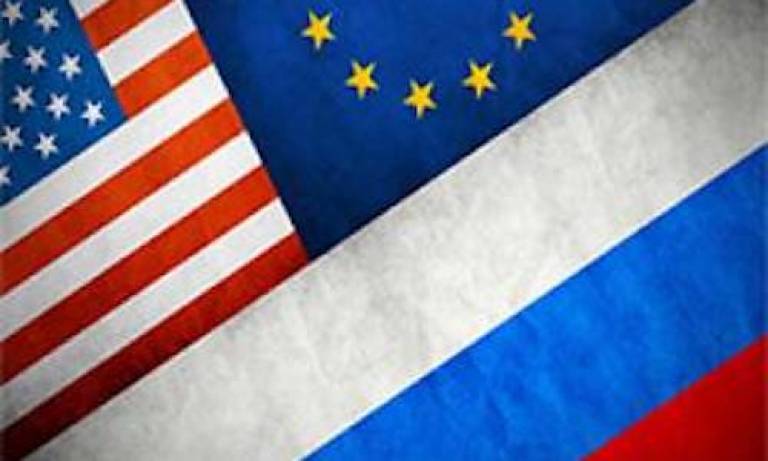Crossing the Great Divide? Reassessing East-West Relations During the Cold War and After
25 January 2018, 6:00 pm–7:30 pm

Event Information
Open to
- All
Join the FRINGE Centre and the UCL Institute of Advanced Studies for a panel discussion on surprising systems of cooperation and conflicts between East and West from the Cold War to the present day.
Thursday, 25 January, 6:00pm-7:30pm
|
When: |
|
Thursday 25 January 2018 |
| Where: |
|
UCL Institute of Advanced Studies (IAS), South Wing, Wilkins Building |
Evolving and multivalent, Russia's relationship to the West is not a simple one to uncover, let alone to evaluate. This panel discussion, with authors Dr. Egle Rindzeviciute and Prof. Irina Busygina will shed new light on East-West relations by analysing sources of contemporary tension and evaluating little known areas of cooperation during the Cold War.
Dr. Egle Rindzeviciute's book 'The Power of Systems' explores the creation of The International Institute of Applied Systems Analysis, an international think tank, set up with the aim of advancing scientific collaboration between the US and Soviet governments during the Cold War.
Prof. Irina Busygina's book 'Russia-EU Relations and the Common Neighborhood' examines contemporary Russia-EU relations and the sources of their deterioration. Differences in the forms and types of power tools used by Russia and the EU are discussed alongside recent shifts in strategies brought about by how both parties wish to be seen on the international stage.
Join both authors and a series of commentators to discuss surprising systems of cooperation and conflicts between East and West from the Cold War to the present day.
Speakers:
Dr Egle Rindzeviciute is a Senior Lecturer in Sociology at Kingston University London, UK. She published on Soviet governance, scientific expertise and cultural policy in such journals as Slavic Review, Cahiers du monde Russe, and The International Journal of Cultural Policy and is the author of Constructing Soviet Cultural Policy: Cybernetics and Governance in Lithuania after World War II (2008); The Power of Systems: How Policy Sciences Opened Up the Cold War World (2016); and the editor of The Struggle for the Long Term in Transnational Science and Politics: Forging the Future (2015) (co-edited with Dr Jenny Andersson).
Prof Irina Busygina is Professor at the Department of Political Science, National Research University "Higher School of Economics" in St. Petersburg. Her research interests include Russia-EU relations, Russian politics, Russian foreign policy, comparative federalism and regionalism. Her publications have appeared in journals such as Europe-Asia Studies, Journal of Borderland Studies, Journal of Eurasian Studies. Her recent books include Political Modernization of the State in Russia: Necessity, Directions, Costs and Risks, Moscow: "Liberal Mission" Foundation (2012, co-author Mikhail Filippov), and Russia-EU Relations and the Common Neighborhood; Coercion vs. Authority, UK and New York: Routledge (2017).
Dr Jonathan Oldfield is Reader in Russian Environmental Studies at the School of Geography, Earth and Environmental Sciences, the University of Birmingham.. esearch explores Russian understandings of physical natural systems with a specific focus on the work and ideas of Russian physical geographers during the late tsarist and Soviet periods. He is the author of Russian nature: exploring the environmental consequences of societal change (2005) and The Development of Russian Environmental Thought: Russian Geographical Perspectives on the Natural Environment, 1880s-1960s (2016, with Denis Shaw).
Dr Poornima Paidipaty is Philomathia Post-Doctoral Research Associate at the Faculty of History, the University of Cambridge. Dr Paidipaty holds a Ph.D. in Anthropology from Columbia University. Her work examines the intersections of decolonisation, governance and modern social science. Dr Paidipaty has ongoing interest in large-scale state sciences (logistics, cartography, statistics, demography and engineering) and their historical implications for understanding economic disparity and democratic politics in South Asia.
About FRINGE
This event is organised by The FRINGE Centre. The FRINGE Centre explores the roles that complexity, ambivalence and immeasurability play in social and cultural phenomena. A cross-disciplinary initiative bringing together scholars from the humanities and social sciences, FRINGE examines how seemingly opposed notions such as centrality and marginality, and clarity and ambiguity, can shift and converge when embedded in everyday practices. Our interest lies in the hidden complexity of all embedded practices, taken-for-granted and otherwise invisible subjects. Illuminating the 'fringe' thus puts the 'centre' in a new light.
Please register for the event here.
 Close
Close

